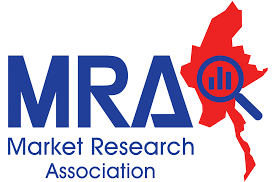
NEWSLETTER
Chairman Message
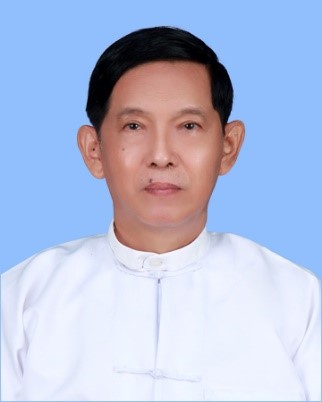
The Central Executive Committee of Market Research Association for 2024-2026 term was formed in July 2024 and its 5th Annual General Meeting was successfully held in August 2024. Key objectives of the Association are: to develop market research industry in Myanmar and to disseminate professional knowledge and procedures in market research among the members. In line with the objectives, the Education committee will hold workshops to share knowledge on market research and ensure development of research industry in the Asia & Pacific Region. MRA members can take advantage of research related trainings arranged by the Education Committee. Some trainings are limited to “Members Only” in which members can get free access/special discounts for workshops and materials published by MRA. However, there will be trainings and workshops which will open to non-members as well.
MRA has developed a work plan for November and December 2024. That includes the launching MRA Newsletter on MRA Webpage and it will cover industry related news, FMCG, consumer & media news, social research, ESOMAR events etc. The newsletter can be accessed by all MRA members, future members, client organizations and trade associations. There will be an MRA knowledge sharing session in November to share experience of the ESOMAR Asia & Pacific Conference held in Bangkok. MRA members and non-members can join the event. An MRA CSR event has been planned and a training on research will be conducted in December 2024.
The activities aim to increase the professional value of Myanmar research professionals and market researchers as well as enhance connectivity among market research industry and other stakeholders such as clients and business associations.
The association has passed a six-year journey during which there was a Covid pandemic and a significant political transition. We now embark on a two-year journey committing ourselves for the development of market research industry and its people in Myanmar. We will do our best to reach out to the research community in Myanmar and the region where our members are a significant component. Although this newsletter will be a very first step, I hope the product is filled with a new and fresh approach that gives a lot of opportunities and benefits to the readers.
U Aung Min
Chairman, MRA
Yangon, Myanmar
November 2024
Research Article:
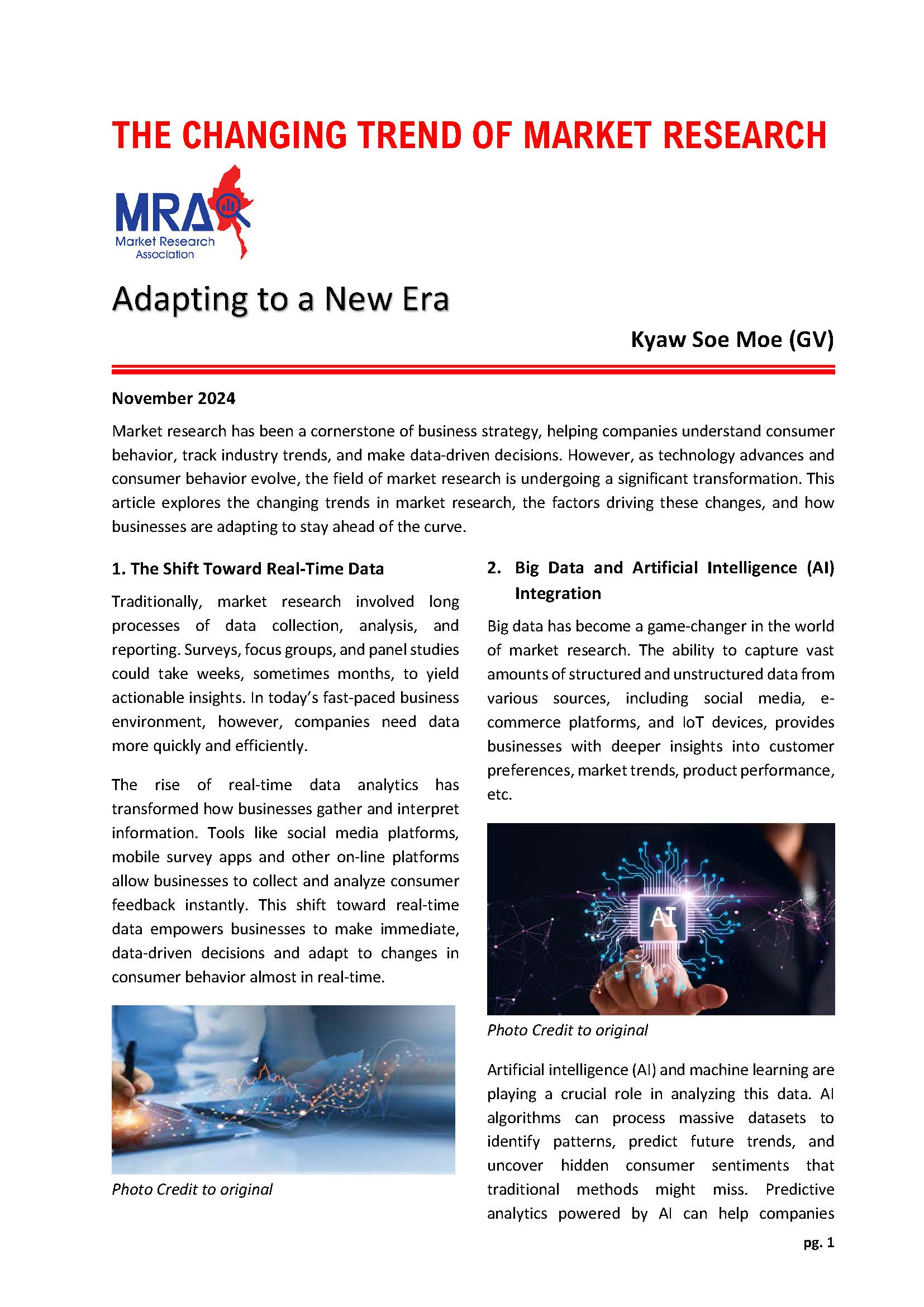
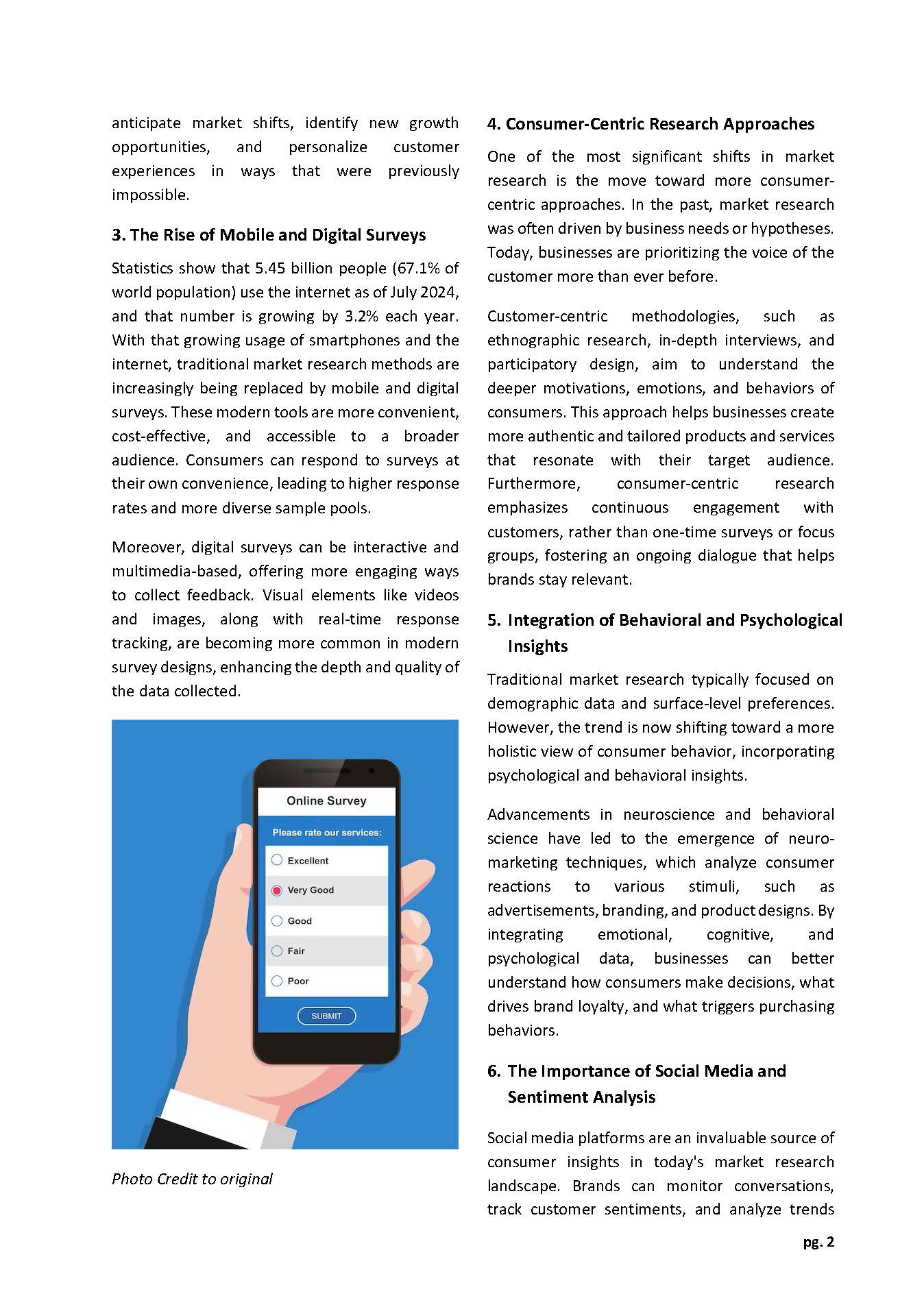
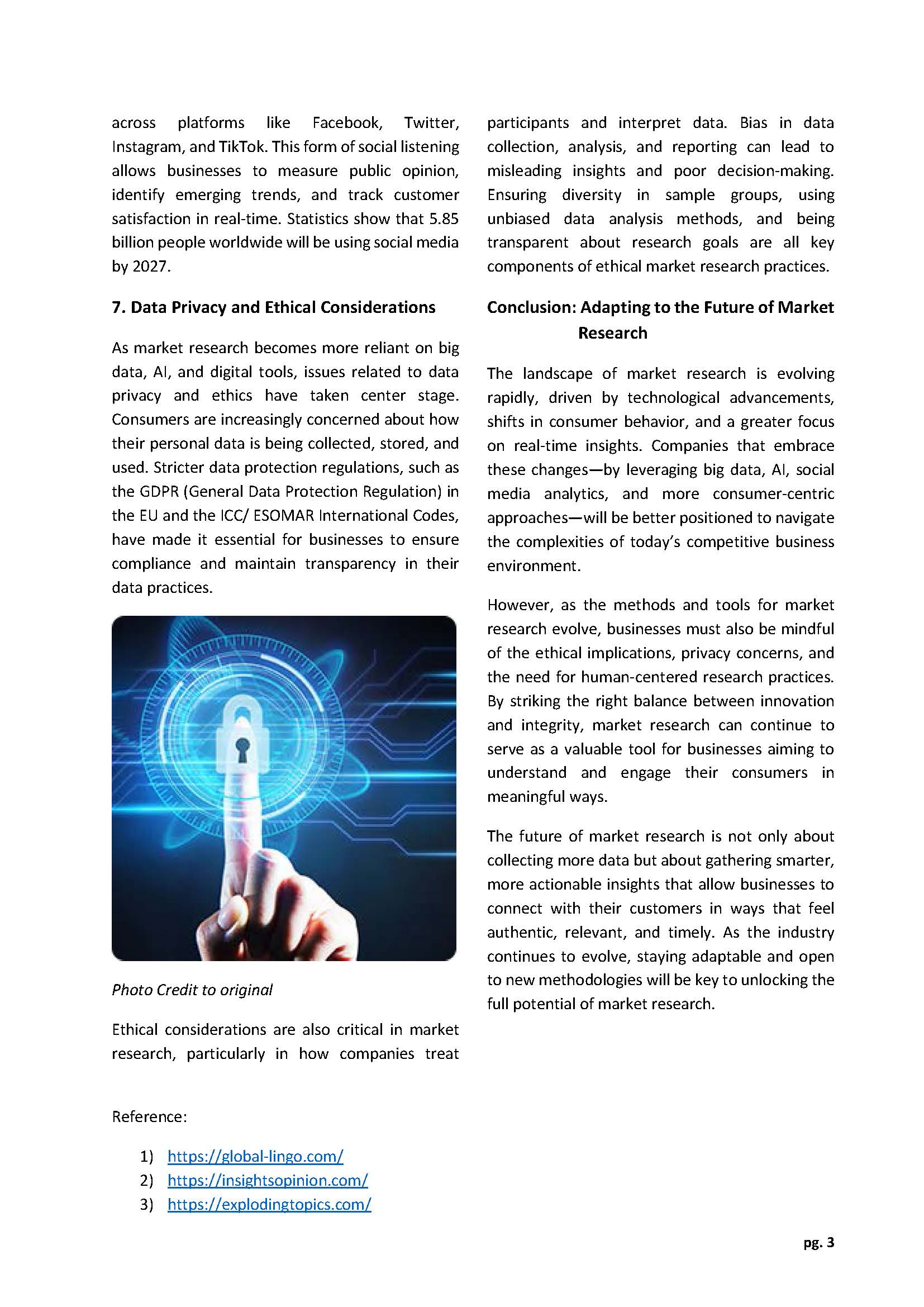
MRA Knowledge Sharing Event of ESOMAR APAC 2024

(Insights and trends from ESOMAR APAC knowledge sharing)
The Market Research Association has conducted its knowledge sharing session. CEC member Dr. Thuta Aung, Secretary Daw Mi May Phyu Phyu Sin, and member U Ye Win Aung attended the ESOMAR APAC 2024 IGNITE Conference held in Bangkok from November 6-9, 2024. On November 30th 2024, there were 120 attendees, both in-person and online, present at the knowledge sharing session to share the insights and trends gained from the ESOMAR conference.
ESOMAR Asia & Pacific Conference
The European Society for Opinion and Marketing Research (ESOMAR) is one of the world’s leading research organizations. Founded in 1947, members hail from a total of 130 different countries. The MRA acts as Myanmar’s representative member. The Asia Pacific region is home to 60% of the world’s population and is responsible for 46% of global GDP. Because of its importance, this year’s ESOMAR conference was held in Bangkok, Thailand, over three days.
MRA Chairman’s Opening Remarks
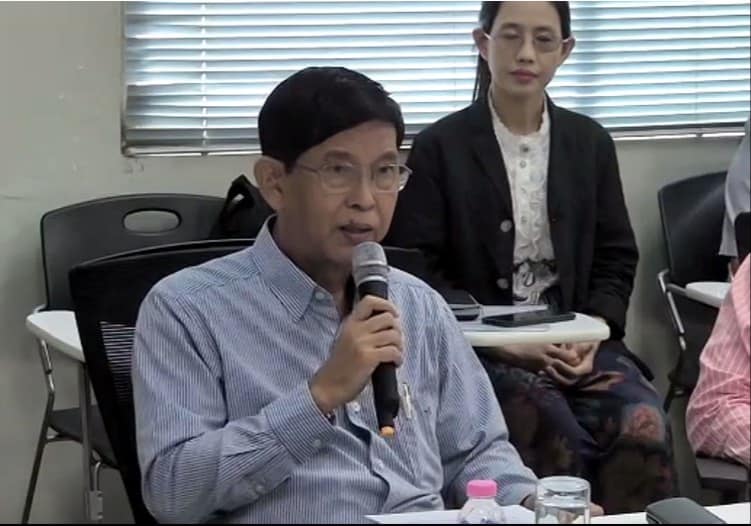
In his opening remarks, MRA Chairman U Aung Min reiterated that the MRA held its 5th annual meeting on August this year and also held a knowledge sharing session, and planned its future activities in the coming year. This includes updating the official MRA websites and starting the MRA newsletter in November, which contains the latest developments and trends in market research. The newsletter is available at www.mrayangon.com.
Currently, utilizing AI technology can reduce manpower, time, and cost, and can open new ways of marketing. To take full advantage of this technology, in the future, there will be a growing need for AI-related skills, not only for market researchers, but also in related industries as well. The MRA chairman hoped that the knowledge sharing session will contain important insights, developments, and discussion for all parties involved.
Chairman also expressed thanks to Ms. Marita, ESOMAR Representative for her continuous support to MRA.
ESOMAR Representative
ESOMAR representative Ms. Marita Schimpl attended the knowledge sharing session in person and in her remarks, explained the objectives for the ESOMAR conference, and thanked the MRA’s members who participated in person. She further spoke more about the increasing usage of AI technology and its benefits.
Sharing Knowledge gained from ESOMAR APAC
Insights from the ESOMAR APAC Conference 2024

MRA Secretary Daw Mi May Phyu Phyu Sin presented Insights from the ESOMAR APAC Conference 2024 during the MRA’s Knowledge Sharing Session, shedding light onto important technological changes and its practical applications in the industry.
Key Themes
1. Pushing Innovation and Creativity to Build Meaningful Connections
During the conference, it was emphasized that creativity is an important aspect of building meaningful connections with stakeholders. Creativity, in turn, breeds innovation. Together, creativity and innovation can create new inventions and ideas that differentiates itself from others, which can garner trust from consumers.
2. Innovation in Market Research
Here are some highlights on new developments with the Market Research Industry.
- AI and Machine Learning
Using Artificial Intelligence (AI) to automate data collection and analysis can make the processes more efficient. For example, market research firms can use chatbots to quickly collect large amounts of data on a broader scale, perform analyses more efficiently, and ultimately enhance the quality and effectiveness of their work.
- Behavioral Data and Neuromarketing
Behavioral data is currently being collected using advanced technology. Biometrics (recognition of people using their unique physical characteristics) and eye-tracking technology can discern both conscious and unconscious behaviors, which can be instrumental in pioneering new untapped markets.
- Data Visualization and Storytelling
Using Data visualization and storytelling can transform insights into engaging and compelling narratives, enhancing the impact of market research presentations.
- Remote and Mobile Research
High smartphone penetration means that research efforts can be conducted over more regions. Consumers in these areas can be quickly contacted, even when the researcher is based in another country, and data can be swiftly collected and analyzed.
3. Advanced Consumer Behavioral Insights
Developing effective strategies is essential for gaining a deeper understanding of consumer behavior.
- Predictive Analytics
Consumer behavior can be predicted using AI, and accordingly, suitable new goods or services can be developed.
- Neuromarketing
Market research firms can use brain-scanning and eye-tracking technology to receive stimulating and though-provoking responses, which can be then be used as a basis to pioneer new market segments.
- Behavioral Segmentation
When expanding a target market, it is important to go beyond conventional techniques like segmenting focus groups and also take their interests and actions into account.
- Contextual Analytics
To understand and forecast the needs of consumers, it is important to take into account other underlying factors, such as local geography, weather patterns, and timing.
4.Sustainability as a Business Strategy
The topic of sustainability as a key part of business strategy and a driving force of growth was also discussed during the conference.
Why is sustainability important?
- Consumers are drawn towards brands that are environmentally conscious and have a strong sense of corporate responsibility.
- Sustainability is known to be a reliable business practice that can also increase profitability.
Firms should craft their long-term business goals with the community and environment in mind, so that everyone benefits in a “Triple Win” strategy.
5. Global and Regional Perspectives
The conference also shined light on global trends and gave information on the Asia-Pacific Region for the Market Research industry. Business strategies that focus long-term on consumers are a necessity for businesses that operate in regional markets and need a competitive advantage. With creativity and innovation, regional market needs can be met and can bridge global boundaries.
6. Marketing with Meaning for Sustainable Growth
Ms. Topaz Subunruk (Thai AirAsia) and Ms. Dangjaithawin Anantachai (INTAGE၊ Thailand) showcased a commercial highlighting the importance of creative business strategies in developing new markets.
Conclusion
As market researchers and business leaders, going forward, it is important to have foresight, and to adopt emerging technologies to have a competitive edge, and thus drive growth. The insights and knowledge gained from the ESOMAR APAC conference will be consumer-centric and continue to be relevant in the future. ESOMAR hopes that all organizations that participated will be able to learn from this knowledge sharing event and improve the industry as a whole.
Key Takeaways: Preparing Myanmar Youth for Changing World

Dr. Thuta Aung, Central Executive Committee Member of Myanmar Research Association and CEO of HamsaHub Consulting, delivered a presentation titled “Preparing Myanmar Youth for Changing World”. The talk emphasized the essential skills that young people require in this global mobility age and the requirement to apply Artificial Intelligence (AI) for personal and professional growth by demonstrating the real-life examples.
Before the presentation, Dr. Thuta Aung provided an overview of his professional background and various positions he holds at different organizations. He is also the author of the book “The Bumblebee Takes Flight”.
In the introductory section, he outlined that young people in their twenties who are planning or starting their career journeys or individuals of any age who are looking to change their careers are the primary focuses of his presentation. He said that in the fast-paced global mobility era, it’s important for young people to understand Artificial Intelligence (AI). And he continued that he would share the insights gained from ESOMAR Conference on how to enhance the application of AI (ChatGPT) beyond basic reference searches.
Next, he delved into the details that familiarity with digital tools became a prerequisite skill for career starters. However, he also highlighted the importance of developing critical thinking and problem-solving skills – the areas where the AI falls short. Next, in the section on how to improve the said skills, he discussed the importance of identifying distinct strengths of AI versus human, backing with an example from data collection methods in market research process to illustrate his point.
He emphasized that communication skill, emotional competency, networking skill, decision making skill (AI can only provide options and it’s human who make the decision) and sense-making abilities (for example, only researchers can determine the validation of data and information) are irreplaceable by AI.
Under the “Coexisting with AI” section, he presented the risks of businesses to be overtaken by AI, providing a real-life example. He also cautioned that the benefits of AI could only be fully realized when applied with human reasoning, as AI has a high tendency to generate incorrect answers.
In demonstrating how to use ChatGPT, he presented how he learned about the Myanmar Competition Law using ChatGPT and how to use ChatGPT features to personalize the search.
In closing, he encouraged young people to become members of Myanmar Research Association (MRA) and pledged MRA’s plan to provide more skills development trainings.
He concluded his presentation by advising Myanmar youths to prepare not only for local competition but also for global rivalry, and by emphasizing that whether to apply AI for career growth or risk the career to be overtaken by AI solely depended on individual choices.
AI’s Impacts on Collaboration and Insight in Market Research

Eric Ye Win Aung, Research Manager, MSR, Member of MRA presented The Power of Big Data; Micro-segmentation and Personalization; Gamification in Data Collection and he encouraged to expand research to include Non-traditional research.

